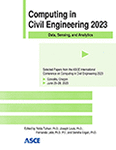Exploration of Latent Themes in Truck-Mounted Attenuator (TMA) Related Accidents Using Natural Language Processing
Publication: Computing in Civil Engineering 2023
ABSTRACT
A truck-mounted attenuator (TMA) is designed to reduce the impacts of crashes and protect workers in mobile work zones. Because of the speed difference between the TMA truck (usually stationary or with very low speed) and surrounding traffic flows, the probability of TMA being crashed into is relatively high. In Indiana, 152 TMA-related accidents were recorded in crash reports between 2016 and 2021. A natural language processing approach was adopted in this study to identify the latent themes of TMA-related crashes, and the co-occurrence of themes that led to these crashes. More specifically, the proposed method started with extracting n-grams (i.e., unigrams, bigrams, and trigrams) from each TMA-related crash report. Then the correlation between each n-gram was calculated and visualized by the network topology. Next, two hypotheses to reduce the impacts of TMA-related accidents were proposed based on the network topology. The hypotheses were: (1) the implementation of autonomous TMA (ATMA) can reduce the number of injuries; and (2) trajectory planning and controlling at the merging area can reduce the number of accidents. The findings of the study include the factors leading to TMA-related crashes and the potential solutions to reduce these TMA-related crashes with the consideration of the recent development of connected and autonomous vehicles (CAV) and related technologies.
Get full access to this article
View all available purchase options and get full access to this chapter.
REFERENCES
Chowdhary, K. R. (2020). Natural Language Processing. In Fundamentals of Artificial Intelligence (pp. 603–649). Springer India. https://doi.org/10.1007/978-81-322-3972-7_19.
Chua, D. K. H., and Goh, Y. M. (2004). Incident Causation Model for Improving Feedback of Safety Knowledge. Journal of Construction Engineering and Management. https://doi.org/10.1061/ASCE0733-93642004130:4542.
Cottrell, B. H., Jr. (2015). Investigation of truck mounted attenuator (TMA) crashes in work zones in Virginia. Virginia Transportation Research Council.
Hardeniya, N. (2015). NLTK essentials : build cool NLP and machine learning applications using NLTK and other Python libraries. Packt Publishing Ltd., Birmingham, UK.
Hu, X., and Sun, J. (2019). Trajectory optimization of connected and autonomous vehicles at a multilane freeway merging area. Transportation Research Part C: Emerging Technologies, 101, 111–125. https://doi.org/10.1016/j.trc.2019.02.016.
Indiana Department of Transportation. (2018). Work Zone Safety. Retrieved on March 25th, 2023 https://www.in.gov/indot/safety/work-zone-safety/.
Jallan, Y., Brogan, E., Ashuri, B., and Clevenger, C. M. (2019). Application of Natural Language Processing and Text Mining to Identify Patterns in Construction-Defect Litigation Cases. Journal of Legal Affairs and Dispute Resolution in Engineering and Construction, 11(4). https://doi.org/10.1061/(asce)la.1943-4170.0000308.
Khattak, A. J., Khattak, A. J., and Council, F. M. (2002). Effects of work zone presence on injury and non-injury crashes. In Accident Analysis and Prevention (Vol. 34). www.elsevier.com/locate/aap.
Kwayu, K. M., Kwigizile, V., and Oh, J. S. (2022). Evaluation of pedestrian crossing-related crashes at undesignated midblock locations using structured crash data and report narratives. In Journal of Transportation Safety and Security (Vol. 14, Issue 1, pp. 1–23). Taylor and Francis Ltd. https://doi.org/10.1080/19439962.2019.1679306.
Kwayu, K. M., Kwigizile, V., Zhang, J., and Oh, J.-S. (2020). Semantic N-Gram Feature Analysis and Machine Learning–Based Classification of Drivers’ Hazardous Actions at Signal-Controlled Intersections. Journal of Computing in Civil Engineering, 34(4). https://doi.org/10.1061/(asce)cp.1943-5487.0000895.
Li, Y., Wang, B., Li, W., and Qin, R. (2023). Simulation Study of Passing Drivers’ Responses to the Autonomous Truck-Mounted Attenuator System in Road Maintenance. Transportation Research Record: Journal of the Transportation Research Board, 036119812211442. https://doi.org/10.1177/03611981221144281.
National Safety Council. (2022). Motor Vehicle Safety Issues. Retrieved on March, 6th, 2023 https://injuryfacts.nsc.org/motor-vehicle/motor-vehicle-safety-issues/work-zones/.
Santos, D., Saias, J., Quaresma, P., and Nogueira, V. B. (2021). Machine learning approaches to traffic accident analysis and hotspot prediction. Computers, 10(12). https://doi.org/10.3390/computers10120157.
Sayed, M. A., Qin, X., Kate, R. J., Anisuzzaman, D. M., and Yu, Z. (2021). Identification and analysis of misclassified work-zone crashes using text mining techniques. Accident Analysis and Prevention, 159. https://doi.org/10.1016/j.aap.2021.106211.
Sun, C., and Feng, H. (2020). Safety Analysis of Truck Mounted Attenuators in Mobile Work Zones Using Differential Analysis. International Conference on Transportation and Development 2020.
Sun, J., Yang, Z., Wang, P., and Liu, S. (2010). Variable length character n-gram approach for online writeprint identification. Proceedings - 2010 2nd International Conference on Multimedia Information Networking and Security, MINES 2010, 486–490. https://doi.org/10.1109/MINES.2010.109.
Tang, Q., Cheng, Y., Hu, X., Chen, C., Song, Y., and Qin, R. (2021). Evaluation methodology of leader-follower autonomous vehicle system for work zone maintenance. In Transportation Research Record (Vol. 2675, Issue 5, pp. 107–119). SAGE Publications Ltd. https://doi.org/10.1177/0361198120985233.
Tian, C., Xiao, J., Chen, Y., Feng, Y., and Zhang, J. (2022). Implementation, Benefits, and Challenges of Autonomous Truck-Mounted Attenuator. International Conference on Transportation and Development.
Yang, H., Ozbay, K., Ozturk, O., and Xie, K. (2015). Work Zone Safety Analysis and Modeling: A State-of-the-Art Review. Traffic Injury Prevention, 16(4), 387–396. https://doi.org/10.1080/15389588.2014.948615.
Information & Authors
Information
Published In
History
Published online: Jan 25, 2024
ASCE Technical Topics:
- Accidents
- Business management
- Construction engineering
- Construction management
- Construction sites
- Engineering fundamentals
- Highway transportation
- Infrastructure
- Mathematics
- Occupational safety
- Practice and Profession
- Probability
- Public administration
- Public health and safety
- Safety
- Traffic accidents
- Traffic engineering
- Traffic flow
- Traffic management
- Traffic speed
- Transportation engineering
- Trucks
- Vehicles
- Work zones
Authors
Metrics & Citations
Metrics
Citations
Download citation
If you have the appropriate software installed, you can download article citation data to the citation manager of your choice. Simply select your manager software from the list below and click Download.
